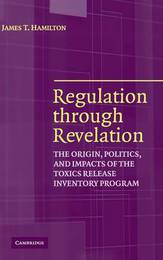
|
Regulation through Revelation: The Origin, Politics, and Impacts of the Toxics Release Inventory Program
Hardback
Main Details
| Title |
Regulation through Revelation: The Origin, Politics, and Impacts of the Toxics Release Inventory Program
|
| Authors and Contributors |
By (author) James T. Hamilton
|
| Physical Properties |
| Format:Hardback | | Pages:358 | | Dimensions(mm): Height 229,Width 152 |
|
| ISBN/Barcode |
9780521855303
|
| Classifications | Dewey:363.730973 |
|---|
| Audience | | Professional & Vocational | |
|---|
| Illustrations |
Worked examples or Exercises
|
|
Publishing Details |
| Publisher |
Cambridge University Press
|
| Imprint |
Cambridge University Press
|
| Publication Date |
29 August 2005 |
| Publication Country |
United Kingdom
|
Description
Information provision is increasingly being used as a regulatory tool. The U.S. Environmental Protection Agency's Toxics Release Inventory (TRI) Program required facilities that handle threshold amounts of specific chemicals to report yearly their releases and transfers of these toxic substances. The TRI data have become the yardstick by which regulators, investors, environmental organizations, and local community groups measure company environmental performance. This books tells the story of the TRI from its origin and implementation to its revision and retrenchment. The mix of case study and quantitative analysis shows how the TRI operates and how the information provided affects decisions in both the public and private sectors. The lessons drawn about the operation of information provision programs should be of interest to multiple audiences.
Author Biography
James T. Hamilton is Charles S. Syndor Professor of Public Policy at Duke University, where he has taught since 1991, as well as a professor of economics and political science there. Professor Hamilton has written or coauthored six books, including All the News That's Fit to Sell: How the Market Transforms Information into News (2004). For his accomplishments in teaching and research he has received awards such as the David N. Kershaw Award from the Association for Public Policy Analysis and Management (2001), the Kennedy School of Government's Goldsmith Book Prize from the Shorenstein Center (1999), and Trinity College's (Duke) Distinguished Teaching Award (1993). Professor Hamilton's scholarly publications reflect his interests in the economics of regulation, public choice/political economy, environmental policy, and the media.
Reviews...everyone should applaud Hamilton's superb scholarship...Highly recommended. -CHOICE, R.E. O'Connor, National Science Foundation
|